Bangladesh’s prime minister announced at a Nov 11 cabinet meeting that hijras will be recognized as a separate gender identity, the Dhaka Tribune reports.
The move will reportedly clear the way for hijras, many of whom do not identify as male or female, to make changes in official documents, including passports, that more accurately reflect their identity, Pink News reports. Cabinet Secretary Muhammad Musharaff Hossain Bhuiyan says the term hijra will be used, as other translations or references would be misleading, the report says.
The cabinet secretary indicated there are 10,000 hijras in Bangladesh, noting that they often face discrimination in the areas of housing, education and health. Others say the number of hijras is much higher, anywhere up to 150,000.
Gay Star News quotes activist Omar Kuddus as saying that the specific identification of hijras as envisioned in the new policy could set them up to be targeted for persecution.
In September, Bangladesh rejected a United Nations recommendation to decriminalize same-sex relationships.


 Why you can trust Xtra
Why you can trust Xtra


